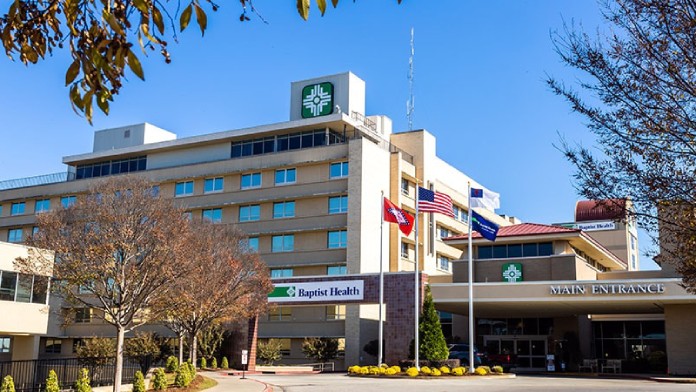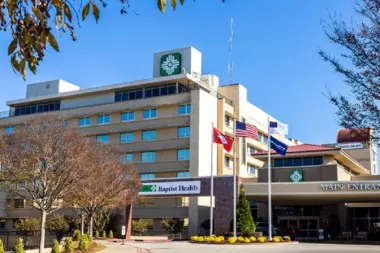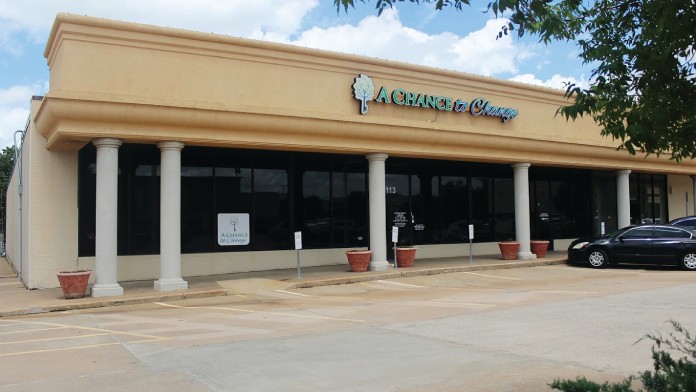About Baptist Health Behavioral Health Services-Fort Smith
Baptist Health Behavioral Health Services in Fort Smith, Arkansas is an outpatient clinic located on the 2nd floor of the Baptist Health Center. There are comprehensive mental health support programs and services provided here. Co-occurring substance abuse issues are dealt with and managed at the same time as other mental health concerns.
There is a medical stabilization program at this location for individuals aged 18 + who are struggling with substance abuse issues with Cocaine, Benzodiazepines, opioids, alcohol, or a combination of substances.
Comprehensive Mental Health Support
Behavioral health services at Baptist Health-Fort Smith include crisis intervention and evaluation with referrals to medical and mental health services. They also conduct personality and neuropsychological testing. Pre-operative assessments are also conducted for patients having surgery or procedures.
Most therapy philosophies used in treatment here are evidence-based, trauma-informed modules. Cognitive Behavioral Therapy is a big one here and is woven into the care and treatment plans of patients receiving addiction treatment here. Relaxation training is something that helps mental health and physical health patients cope with the stresses of life and the health challenges they may be having.
Substance Abuse and Withdrawal Support
There are medical stabilization and withdrawal management services offered through the New Vision Clinic. The initial medical stabilization stay is approximately 72 hours. Individuals are referred by a licensed physician and will be provided confidential care by a team of expert doctors, nurses, and support staff who have experience and training in addiction and managing withdrawal.
Patients are monitored 24 hours a day while receiving care in the New Visions Clinic. There is an extensive pre-screening program and individual discharge plans to help ensure patients have the supports and resources they need from beginning to end of their treatment journey.
Full-Service Health Center
This full-service hospital with close to 500 licensed beds is Arkansas’ oldest hospital, dating back to 1887. Just because it’s old doesn’t mean its practices are outdated. This is a Level 3 trauma center and can deal with complex medical and mental health situations for the residents of Fort Smith and surrounding areas.
Facility Overview
Rehab Score
Gallery


Accepted Insurance
Other Forms of Payment
Medicaid is a state based program that helps lower-income individuals and families pay for healthcare. Medicaid covers addiction treatment so those enrolled can use their coverage to pay for rehab. When a program accepts Medicaid the client often pays very little or nothing out of their own pocket.
Medicare is a federal program that provides health insurance for those 65 and older. It also serves people under 65 with chronic and disabling health challenges. To use Medicare for addiction treatment you need to find a program that accepts Medicare and is in network with your plan. Out of pocket costs and preauthorization requirements vary, so always check with your provider.
Self-pay involves paying for treatment out of your own pocket. You can use savings or credit, get a personal loan, or receive help from family and friends to fund your treatment. If you don't have insurance or your insurance plan doesn't cover a specific program, self-pay can help ensure you still get the care you need.
Addiction Treatments
Levels of Care
Outpatient Programs (OP) are for those seeking mental rehab or drug rehab, but who also stay at home every night. The main difference between outpatient treatment (OP) and intensive outpatient treatment (IOP) lies in the amount of hours the patient spends at the facility. Most of the time an outpatient program is designed for someone who has completed an inpatient stay and is looking to continue their growth in recovery. Outpatient is not meant to be the starting point, it is commonly referred to as aftercare.
Residential treatment programs are those that offer housing and meals in addition to substance abuse treatment. Rehab facilities that offer residential treatment allow patients to focus solely on recovery, in an environment totally separate from their lives. Some rehab centers specialize in short-term residential treatment (a few days to a week or two), while others solely provide treatment on a long-term basis (several weeks to months). Some offer both, and tailor treatment to the patient's individual requirements.
Treatments
Mental health rehabs focus on helping individuals recover from mental illnesses like bipolar disorder, clinical depression, anxiety disorders, schizophrenia, and more. Mental health professionals at these facilities are trained to understand and treat mental health issues, both in individual and group settings.
Programs
Adult rehab programs include therapies tailored to each client's specific needs, goals, and recovery progress. They are tailored to the specific challenges adult clients may face, including family and work pressures and commitments. From inpatient and residential treatment to various levels of outpatient services, there are many options available. Some facilities also help adults work through co-occurring conditions, like anxiety, that can accompany addiction.
Young adulthood can be an exciting, yet difficult, time of transition. Individuals in their late teens to mid-20s face unique stressors related to school, jobs, families, and social circles, which can lead to a rise in substance use. Rehab centers with dedicated young adult programs will include activities and amenities that cater to this age group, with an emphasis on specialized counseling, peer socialization, and ongoing aftercare.
Clinical Services
Cognitive Behavioral Therapy (CBT) is a therapy modality that focuses on the relationship between one's thoughts, feelings, and behaviors. It is used to establish and allow for healthy responses to thoughts and feelings (instead of unhealthy responses, like using drugs or alcohol). CBT has been proven effective for recovering addicts of all kinds, and is used to strengthen a patient's own self-awareness and ability to self-regulate. CBT allows individuals to monitor their own emotional state, become more adept at communicating with others, and manage stress without needing to engage in substance abuse.
Research clearly demonstrates that recovery is far more successful and sustainable when loved ones like family members participate in rehab and substance abuse treatment. Genetic factors may be at play when it comes to drug and alcohol addiction, as well as mental health issues. Family dynamics often play a critical role in addiction triggers, and if properly educated, family members can be a strong source of support when it comes to rehabilitation.
Group therapy is any therapeutic work that happens in a group (not one-on-one). There are a number of different group therapy modalities, including support groups, experiential therapy, psycho-education, and more. Group therapy involves treatment as well as processing interaction between group members.
In individual therapy, a patient meets one-on-one with a trained psychologist or counselor. Therapy is a pivotal part of effective substance abuse treatment, as it often covers root causes of addiction, including challenges faced by the patient in their social, family, and work/school life.
Contact Information
1001 Towson Avenue Suite 500
Fort Smith, AR 72901



